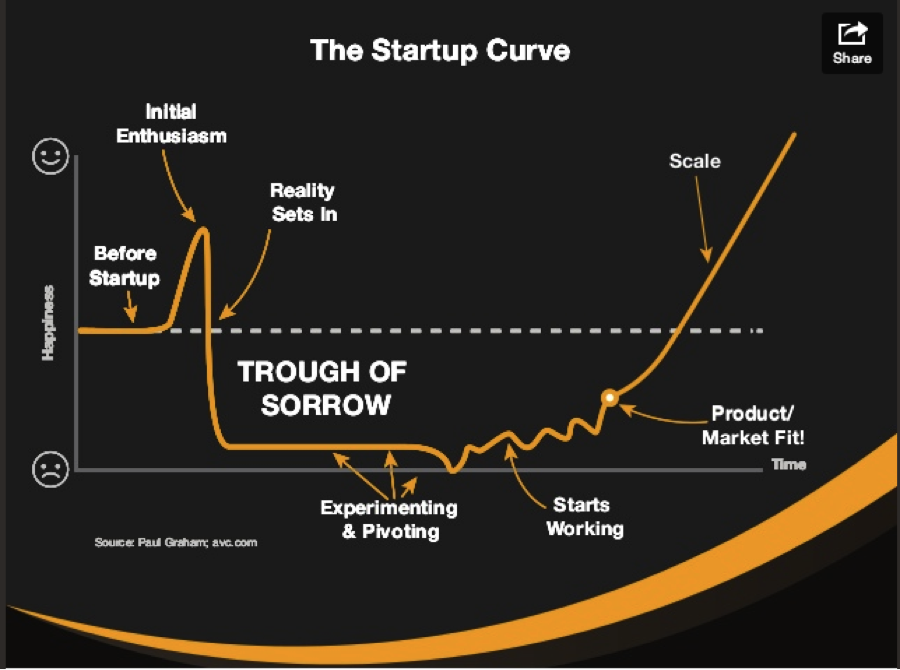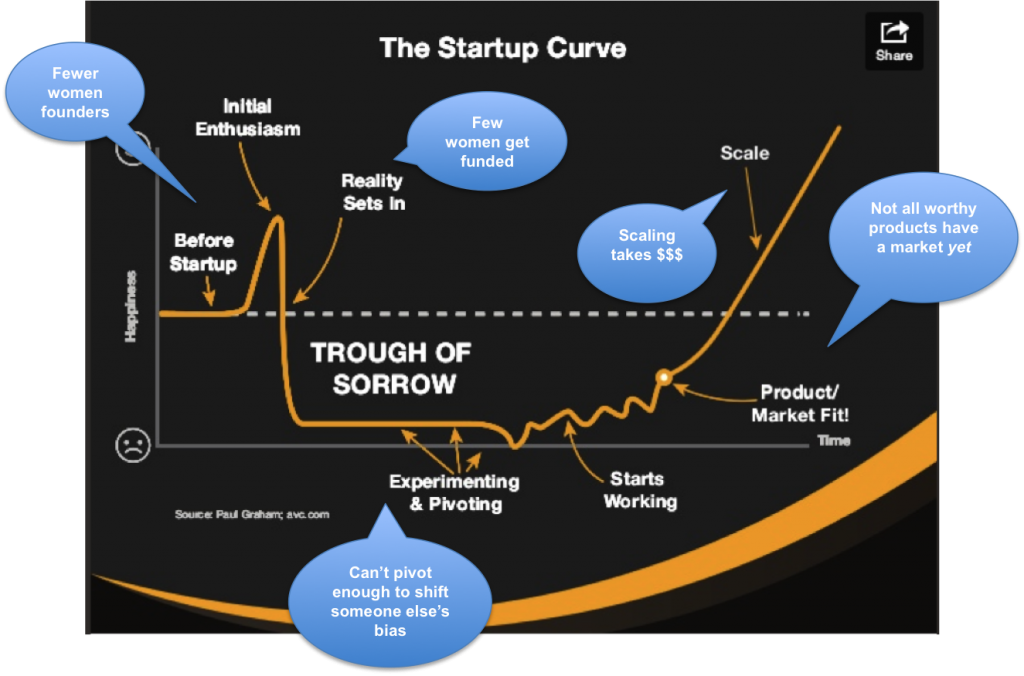The Different Life Trajectories of Women-Led Startups
Remember that great Fortune column by Warren Buffett a few years ago on how women are the world’s greatest untapped resource and the key to America’s economic prosperity? We might return to it as we think about what makes startups successful.
In his presentation at LEAN UX NYC last year, Trevor Owens (co-founder of Javelin, author of The Lean Enterprise), shared this slide below, originally from Paul Graham, showing the lifecycle most startups go through before they become viable businesses (let alone, “learning organizations” capable of surviving):
There’s a lot more to his talk and it’s an interesting one, but I’ve been thinking about this image for months.
My first startup, a media organization dedicated to knowledge sharing in the social justice space that I co-founded at 24 (with zero business acumen at the time and a whole lot of editorial enthusiasm) with Jeanne Dasaro didn’t have a chance of making it past the trough of sorrow. We closed after four years of writing articles and organizing dialogues for little to no money, and a couple of shout outs in O Magazine and The Boston Globe that kept our confidence up for a while. But still this slide rang true for me. I remember the trough of sorrow well! And then the slide didn’t. It showed an incomplete picture. It seemed to have a few things missing:
This slide reflects where the startup community is stuck I think, precisely because of what it doesn’t take into account. Or, to put it in lean terms, reflects a problem that needs to be made visible and solved. Not a problem with women per se, but one relevant to the whole startup ecosystem that has to do with acknowledging and working with difference. A great example of this is the research we have about how investors are more likely to give to men than women who are pitching the exact same idea.
I call the problem “the lack of a gender equity lens,” but I’m not sure that’s it yet, not until we hear from more men, and more white moneyed men, on the topic. If you see the same gaps, these gaps have to do with the kinds of companies we collectively are capable of creating and the kind of ideas and work we’re willing to help make viable businesses. The problem when you leave a gender equity lens out of entrepreneurship or business development isn’t that men don’t create good businesses; to echo Buffett, it’s that you create the conditions for essentially wasting half the world’s talent. You stop businesses from being the best they can be, you stop ideas that happen to come from women before they get off the ground. The assumption I’m working from is that the health of our organizations and communities depends on the thinking of all of its people, not just white men with money.
Why are women’s business ideas important? Research tells us gender diverse teams are smarter then homogenous teams. The New York Times just published yet another article about this. Sallie Krawcheck, one of the most successful women on Wall Street, now Chair of Ellevate, said it best at S.H.E. Summit 2014: “Gender diverse teams don’t necessarily make faster decisions, but they make more effective ones.” Scale that thinking up and the same goes for the larger startup community. To quote systems change thinker Tuesday Ryan-Hart, “We’re constantly looking for research to confirm what we already know. Research is important, but at some point you act.”
The Challenge for the Startup Community (Tech or Otherwise) and the Interestingness of The Lean Startup Community When It Comes to Gender Equity
The lean community – a community I fell into eight years ago – is ripe for changing the startup scene, not just because of Eric Ries’s helpful and wildly popular book The Lean Startup, but because lean thinking is all about looking at problems straight on and getting to root cause. What I love about lean thinking and Lean Startup thinking both, is the focus on learning, working with uncertainty, and experimentation. You can’t go a day in this world without talking about three things:
- problems (aka opportunities for improvement/something better)
- waste (time, energy, resources, effort)
- effectiveness
So, we’re wasting half the world’s talent and choosing to work in less diverse leadership teams in spite of research that we know this is bad for us. We would be more effective if we used the intelligence of women by pro-actively inviting women founders to show up in well-connected, moneyed spaces. And not just entertaining their ideas when they get there, but following their leadership. We might be more effective not only in building our own awesome, but narrowly-focused startups, but at solving the right problems in society. Not because women are necessarily more effective at anything, but because they bring different skills and talents by virtue of different lived experiences. Difference is where the intelligence and money’s at.
Innovators and #Walkouts Who Are Changing Our Existing Systems
Ok, we’ve got plenty of research about how tough it is for women founders out there. So who are the people and organizations changing things for the better?
The Lean Startup Conference and LEAN UX NYC are two conferences I know that are doing a stellar job of making sure conferences are representative of the world we actually live in. Sarah Milstein, CEO of Lean Startup Productions, has written extensively on how to make for gender balanced gatherings. Of the two LEAN UX NYC conferences I’ve attended, women have been extremely well represented. The 3 % conference is another conference leading the pack at making the best use of women’s talents. Pipeline Fellowship is an organization quickly transforming the investing scene. Who else would you add to this list?
The challenge I see now is spreading what works in terms of making the startup scene more equitable and, for those who like the idea of gender and racial equity, but don’t know how to make way for it – merging the actual thought leadership on entrepreneurship with the thought leadership on bias, like this great video from Race Forward. This “Two Loops” systems change video by Deborah Frieze below also feels like a potential starting place and gives me hope. It’s about walking OUT of systems and ways of working that no longer serve us and walking ON to create new systems and ways of working that do. And, perhaps most importantly, it tells the story of how important it is for #walkouts to find other walkouts (in the startup community or any other community):
Two Loops: How Systems Change from The Berkana Institute on Vimeo.
Did my super idealist startup dedicated to knowledge sharing for social justice fail because I was a young, queer, woman co-founder of working class roots? No, it failed for a bunch of reasons. But gender bias is a fact I faced and a fact women co-founders face every day. It’s a very real roadblock. The story we need to break (as in actively debunk), as Joe Nocero argued beautifully in his recent column “Silicon Valley’s Mirror Effect,” is that ideas are judged purely on merit. It’s just not true. But we hang on to it as truth because I think we’re scared of what’s next. We’re just not “ready” for women to lead, whatever that means.
For any man willing to take this problem on in partnership with women who are already fighting this fight, you’re way ahead of the game. Go team. Until more people acknowledge this problem of gender inequity pretty much everywhere, I’m looking forward to supporting the work of #walkouts in this space.


